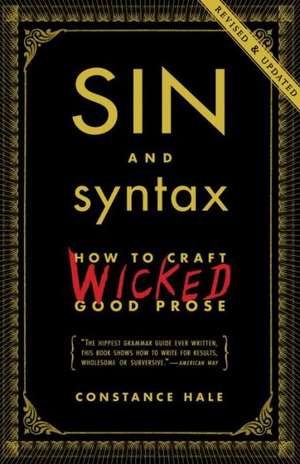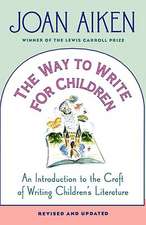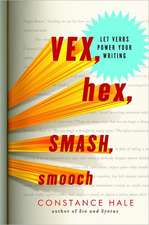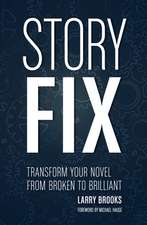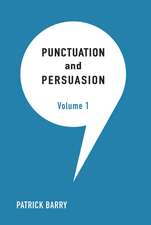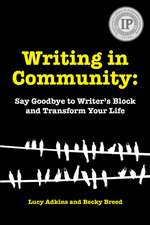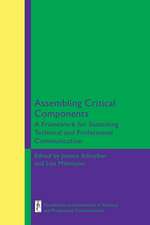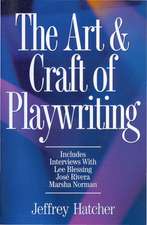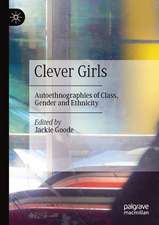Sin and Syntax: How to Craft Wicked Good Prose
Autor Constance Haleen Limba Engleză Paperback – 12 aug 2013
Today’s writers need more spunk than Strunk: whether it's the Great American e-mail, Madison Avenue advertising, or Grammy Award-winning rap lyrics, memorable writing must jump off the page. Copy veteran Constance Hale is on a mission to make creative communication, both the lyrical and the unlawful, an option for everyone.
With its crisp, witty tone, Sin and Syntax covers grammar’s ground rules while revealing countless unconventional syntax secrets (such as how to use—Gasp!—interjections or when to pepper your prose with slang) that make for sinfully good writing. Discover how to:
*Distinguish between words that are “pearls” and words that are “potatoes”
* Avoid “couch potato thinking” and “commitment phobia” when choosing verbs
* Use literary devices such as onomatopoeia, alliteration, and metaphor (and understand what you're doing)
Everyone needs to know how to write stylish prose—students, professionals, and seasoned writers alike. Whether you’re writing to sell, shock, or just sing, Sin and Syntax is the guide you need to improve your command of the English language.
Preț: 73.46 lei
Preț vechi: 88.25 lei
-17% Nou
Puncte Express: 110
Preț estimativ în valută:
14.06€ • 14.68$ • 11.63£
14.06€ • 14.68$ • 11.63£
Carte disponibilă
Livrare economică 15-22 martie
Livrare express 01-07 martie pentru 35.04 lei
Preluare comenzi: 021 569.72.76
Specificații
ISBN-13: 9780385346894
ISBN-10: 0385346891
Pagini: 320
Dimensiuni: 133 x 203 x 17 mm
Greutate: 0.25 kg
Editura: Three Rivers Press (CA)
ISBN-10: 0385346891
Pagini: 320
Dimensiuni: 133 x 203 x 17 mm
Greutate: 0.25 kg
Editura: Three Rivers Press (CA)
Notă biografică
Constance Hale (chale@well.com) is the author of Wired Style, the one-of-a-kind guide to online English usage and geekspeak that was hailed by Newsweek as "The Chicago Manual of Style for the Millennium." A former editor at Wired, Hale has written for numerous publications including the San Francisco Examiner and The Microsoft Network. She has created maverick writing courses for people of all ages, including a popular seminar called "Grammar for Grownups," and currently teaches at U.C. Berkeley. She lives in Oakland, California.
Extras
Words
The French mime Etienne Decroux used to remind his students, "One pearl is better than a whole necklace of potatoes." What is true for that wordless art form applies equally to writing: well-crafted prose depends on the writer's ability to discriminate between pearls and potatoes. Only some words are fit to be strung into sentences.
Great writers are meticulous with their pearls, sifting through piles of words and stringing only perfect specimens upon the thread of syntax. The careful execution of beautiful, powerful prose through beautiful, powerful words is guided by these principles:
Relish every word. True prose stylists carry on an impassioned, lifelong love affair with words, banishing bad words like so many banal suitors, burnishing the good ones till they shimmer. Be infatuated, be seduced, be obsessed.
But be smart about words, too. "All words are pegs to hang ideas on," wrote nineteenth-century essayist Henry Ward Beecher: words not linked to ideas are not worthy of writing-or reading. Once you've committed your words to paper (or to the screen), test each term. Does it carry your idea? Does it express, exactly, that once inchoate thought?
Sensitize yourself to denotation and connotation. Denotation, the dictionary definition of a word, refers to its explicit or literal meanings. Connotation, the suggestive power of a word, refers to its implicit or latent meanings. The denotations of peach (a single-seeded fruit with tangy yellowish pulp and downy skin that goes from yellow to red) and mango (a single-seeded fruit with a tangy yellowish pulp and firm skin mottled with greens, yellows, and reds) differ only slightly. But where peach summons up hot summers in Georgia and the cheeks of a Southern belle, mango conjures images of India and Mexico-and the paintings of Gauguin. The two fruits may be interchangeable in cooking, but wouldn't it be a mistake to swap in mango when writing about, say, the dusty peach chambres of a grande dame with a thing for Louis XVI?
Beyond the sense of a word is its sensuousness: its sound, its cadence, its spirit. In turning a phrase, let the words build like a jazz riff, allowing the meanings and melodies of one word to play off the meanings and melodies of the words around it.
Be simple, but go deep. The exquisite "cutouts" of Matisse and elegant line drawings of Picasso came late in long careers of painstaking work and wild experimentation. In writing as in painting, simplicity often follows considerable torment. "People used to call me a good writer," mused John Ruskin, giant of the nineteenth-century essay. "Now they say I can't write at all; because, for instance, if I think anybody's house is on fire, I only say, 'Sir, your house is on fire.' . . . I used to say, 'Sir, the abode in which you probably passed the delightful days of youth is in a state of inflammation.' "
Verbose is not a synonym for literary. A member of the British Parliament once commented that if a bureaucrat had tried to express Lord Nelson's "England expects every man to do his duty," posterity would have been left with England anticipates that as regards the current emergency personnel will face up to the issues and exercise appropriately the functions allocated to their respective occupation groups. Bureaucrats and business writers too often prefer big, words when they're naming little things. Let's not forsake short, common words that name big things-hope and pride, for example-or simple couplings that leave concrete impressions, like the red wheelbarrow. Shakespeare's "sleep that knits up the ravell'd sleeve of care" uses simple words to go deep. No big-shot words, but a big idea.
It's not enough, though, to be just simple. "Nine pounds where three are sufficient is obesity," said Frank Lloyd Wright. "But to eliminate expressive words in speaking or writing-words that intensify or vivify meaning-is not simplicity. It may be, or usually is, stupidity."
Henry David Thoreau pored over Walden, revising it again and again to find words that "intensify or vivify meaning." This journal entry left him unsatisfied:
I have travelled some in New England, especially in Concord, and I found that no enterprise was on foot which it would not disgrace a man to take part in. They seemed to be employed everywhere in shops and offices and fields. They seemed, like the Brahmins of the East, to be doing penance in a thousand, curious, unheard-of ways.
Setting upon those sentences, clearing the unnecessary words and repetitions, Thoreau crafted a single sentence with greater power:
I have travelled a good deal in Concord, and everywhere, in shops and offices and fields; the inhabitants have seemed to me to be doing penance in a thousand curious ways.
Thoreau manages to make his idea more specific by panning right in on Concord, paring down his repetitions (they, initially repeated twice, is swept away by the stronger inhabitants), and cutting more quickly to the final, stirring phrase.
Take risks. After having suffered the hyperactive red pens of schoolmarms and the hypercorrect rules of inflexible pedagogues, too many of us have retreated to the realm of the safe, the standard, and the vague. A "mixture of vagueness and sheer incompetence is the most marked characteristic of modern English prose," wrote George Orwell in "Politics and the English Language." "As soon as certain topics are raised, the concrete melts into the abstract and no one seems able to think of turns of speech that are not hackneyed: prose consists less and less of words chosen for the sake of their meaning, and more and more of phrases tacked together like the sections of a prefabricated hen-house."
Hidden in such prefab prose is a fear of going to the edge. But it's romping around on the fringes of language that gives writing its frisson. The right word might be snagged off the street, snatched from another language, or hatched in the sand tray of the imagination. Dive into the polyglot English tongue, taking a cue from Walt Whitman, that high priest of the rambunctious:
I like limber, lasting, fierce words. I like them applied to myself-and I like them in newspapers, courts, debates, Congress. Do you suppose the liberties and the brawn of These States have to do only with delicate lady-words? with gloved gentleman words? Bad presidents, bad judges, bad clients, bad editors, owners of slaves, and the long ranks of Northern political suckers (robbers, traitors, suborned), monopo lists, infidels, . . . shaved persons, supplejacks, ecclesiastics, men not fond of women, women not fond of men, cry down the use of strong, cutting, beautiful rude words. [But] to the manly instincts of the People they will be forever welcome.
Whitman's American English scarfs up words from other languages with a vengeance. If someone's bugging you, you can go the Anglo-Saxon route and shun her; or you can avoid her (Latin); or you can eschew her (French). Or you tell her to get outta your face. Don't shun slang, especially when it's vivid and musical and fills a gap in the lexicon. Think of the words Shakespeare invented: the adjectives long-haired, lackluster, unqualitied, green-eyed, heartsick, and hot-blooded, the nouns want-wit, vinegar aspect, and wit-snapper, and the verbs in lines like "You unlace your reputation thus" or "The tears that spanieled me at heels." More modern neologists have kept up the mischief, giving us gems like snafu, snarky, muckety-mucks, chump change, copacetic, airhead, hacker, and, oh, babelicious.
A word not in the dictionary is not out of bounds. Isn't the newly popular noun bloviator perfect to describe that dude who can't get enough of his own voice? H. L. Mencken carried on about coinages bubbling up out of the American experience; one of his favorites, rubberneck, he called "almost a complete treatise on American psychology . . . [conveying the] boldness and contempt for ordered forms that are so characteristically American . . . the grotesque humor of the country, the delight in devastating opprobriums, and the acute feeling for the succinct and savory."
You tell 'em, H. L.!
The French mime Etienne Decroux used to remind his students, "One pearl is better than a whole necklace of potatoes." What is true for that wordless art form applies equally to writing: well-crafted prose depends on the writer's ability to discriminate between pearls and potatoes. Only some words are fit to be strung into sentences.
Great writers are meticulous with their pearls, sifting through piles of words and stringing only perfect specimens upon the thread of syntax. The careful execution of beautiful, powerful prose through beautiful, powerful words is guided by these principles:
Relish every word. True prose stylists carry on an impassioned, lifelong love affair with words, banishing bad words like so many banal suitors, burnishing the good ones till they shimmer. Be infatuated, be seduced, be obsessed.
But be smart about words, too. "All words are pegs to hang ideas on," wrote nineteenth-century essayist Henry Ward Beecher: words not linked to ideas are not worthy of writing-or reading. Once you've committed your words to paper (or to the screen), test each term. Does it carry your idea? Does it express, exactly, that once inchoate thought?
Sensitize yourself to denotation and connotation. Denotation, the dictionary definition of a word, refers to its explicit or literal meanings. Connotation, the suggestive power of a word, refers to its implicit or latent meanings. The denotations of peach (a single-seeded fruit with tangy yellowish pulp and downy skin that goes from yellow to red) and mango (a single-seeded fruit with a tangy yellowish pulp and firm skin mottled with greens, yellows, and reds) differ only slightly. But where peach summons up hot summers in Georgia and the cheeks of a Southern belle, mango conjures images of India and Mexico-and the paintings of Gauguin. The two fruits may be interchangeable in cooking, but wouldn't it be a mistake to swap in mango when writing about, say, the dusty peach chambres of a grande dame with a thing for Louis XVI?
Beyond the sense of a word is its sensuousness: its sound, its cadence, its spirit. In turning a phrase, let the words build like a jazz riff, allowing the meanings and melodies of one word to play off the meanings and melodies of the words around it.
Be simple, but go deep. The exquisite "cutouts" of Matisse and elegant line drawings of Picasso came late in long careers of painstaking work and wild experimentation. In writing as in painting, simplicity often follows considerable torment. "People used to call me a good writer," mused John Ruskin, giant of the nineteenth-century essay. "Now they say I can't write at all; because, for instance, if I think anybody's house is on fire, I only say, 'Sir, your house is on fire.' . . . I used to say, 'Sir, the abode in which you probably passed the delightful days of youth is in a state of inflammation.' "
Verbose is not a synonym for literary. A member of the British Parliament once commented that if a bureaucrat had tried to express Lord Nelson's "England expects every man to do his duty," posterity would have been left with England anticipates that as regards the current emergency personnel will face up to the issues and exercise appropriately the functions allocated to their respective occupation groups. Bureaucrats and business writers too often prefer big, words when they're naming little things. Let's not forsake short, common words that name big things-hope and pride, for example-or simple couplings that leave concrete impressions, like the red wheelbarrow. Shakespeare's "sleep that knits up the ravell'd sleeve of care" uses simple words to go deep. No big-shot words, but a big idea.
It's not enough, though, to be just simple. "Nine pounds where three are sufficient is obesity," said Frank Lloyd Wright. "But to eliminate expressive words in speaking or writing-words that intensify or vivify meaning-is not simplicity. It may be, or usually is, stupidity."
Henry David Thoreau pored over Walden, revising it again and again to find words that "intensify or vivify meaning." This journal entry left him unsatisfied:
I have travelled some in New England, especially in Concord, and I found that no enterprise was on foot which it would not disgrace a man to take part in. They seemed to be employed everywhere in shops and offices and fields. They seemed, like the Brahmins of the East, to be doing penance in a thousand, curious, unheard-of ways.
Setting upon those sentences, clearing the unnecessary words and repetitions, Thoreau crafted a single sentence with greater power:
I have travelled a good deal in Concord, and everywhere, in shops and offices and fields; the inhabitants have seemed to me to be doing penance in a thousand curious ways.
Thoreau manages to make his idea more specific by panning right in on Concord, paring down his repetitions (they, initially repeated twice, is swept away by the stronger inhabitants), and cutting more quickly to the final, stirring phrase.
Take risks. After having suffered the hyperactive red pens of schoolmarms and the hypercorrect rules of inflexible pedagogues, too many of us have retreated to the realm of the safe, the standard, and the vague. A "mixture of vagueness and sheer incompetence is the most marked characteristic of modern English prose," wrote George Orwell in "Politics and the English Language." "As soon as certain topics are raised, the concrete melts into the abstract and no one seems able to think of turns of speech that are not hackneyed: prose consists less and less of words chosen for the sake of their meaning, and more and more of phrases tacked together like the sections of a prefabricated hen-house."
Hidden in such prefab prose is a fear of going to the edge. But it's romping around on the fringes of language that gives writing its frisson. The right word might be snagged off the street, snatched from another language, or hatched in the sand tray of the imagination. Dive into the polyglot English tongue, taking a cue from Walt Whitman, that high priest of the rambunctious:
I like limber, lasting, fierce words. I like them applied to myself-and I like them in newspapers, courts, debates, Congress. Do you suppose the liberties and the brawn of These States have to do only with delicate lady-words? with gloved gentleman words? Bad presidents, bad judges, bad clients, bad editors, owners of slaves, and the long ranks of Northern political suckers (robbers, traitors, suborned), monopo lists, infidels, . . . shaved persons, supplejacks, ecclesiastics, men not fond of women, women not fond of men, cry down the use of strong, cutting, beautiful rude words. [But] to the manly instincts of the People they will be forever welcome.
Whitman's American English scarfs up words from other languages with a vengeance. If someone's bugging you, you can go the Anglo-Saxon route and shun her; or you can avoid her (Latin); or you can eschew her (French). Or you tell her to get outta your face. Don't shun slang, especially when it's vivid and musical and fills a gap in the lexicon. Think of the words Shakespeare invented: the adjectives long-haired, lackluster, unqualitied, green-eyed, heartsick, and hot-blooded, the nouns want-wit, vinegar aspect, and wit-snapper, and the verbs in lines like "You unlace your reputation thus" or "The tears that spanieled me at heels." More modern neologists have kept up the mischief, giving us gems like snafu, snarky, muckety-mucks, chump change, copacetic, airhead, hacker, and, oh, babelicious.
A word not in the dictionary is not out of bounds. Isn't the newly popular noun bloviator perfect to describe that dude who can't get enough of his own voice? H. L. Mencken carried on about coinages bubbling up out of the American experience; one of his favorites, rubberneck, he called "almost a complete treatise on American psychology . . . [conveying the] boldness and contempt for ordered forms that are so characteristically American . . . the grotesque humor of the country, the delight in devastating opprobriums, and the acute feeling for the succinct and savory."
You tell 'em, H. L.!
Recenzii
“Probably the hippest grammar guide ever written, this book shows how to write for results, wholesome or subversive.” —American Way
“This new grammar book is light-years ahead of what you’d read in eighth-grade English: With vivid, contemporary examples of what to do and what not to do, it’s fun to read.” —Charlotte Observer
“In ‘Sin and Syntax: How to Craft Wickedly Effective Prose,’ Constance Hale provides a plugged-in, cutting-edge alternative to the must prescriptions of Strunk and White. Here you will find an open-minded, exuberant approach to style that is intelligent and refreshing.” —Charles Harrington Elster, in The San Diego Union-Tribune
“Hale has put together a writing/grammar manual that is fresh and fun. The basic rules are here, and they are well explained. The ‘sin’ from the title is partly advice on when and how to break these rules. The other sins are examples of oft-repeated mistakes…..this guide will help [readers] use effective and artful language. The examples range from Dr. Seuss books to John F. Kennedy's speeches to commercials…. Easy to understand and appealing to a broad range of readers, this book is highly recommend for all libraries.” —Alisa J. Cihlar, Monroe P.L., WI, in Library Journal
“This is a wonderful how-to-book about writing stuff people want to read. Those who have studied the subject might think of Hale as a peacemaker between the Strunk and White tribe devoted to precision and the more entertaining descendants of Henry Mencken, full of energy and inventions. Nonwriters who just want advice that won’t put them to sleep will find sentences they can dance to.” —Make Maza in The Dallas Morning News
“Constance Hale, in ‘Sin and Syntax: How to Craft Wickedly Effective Prose,’ is the first grammarian I’ve seen in a long time brave enough to revive diagramming.” —Ed Gray, in the Arkansas Democrat-Gazette
“Hale’s analyses of texts, from Faulkner’s Absalom, Absalom! To the jargon-laden prose of government and corporate documents, are full of insight because she lets the reader in on how language has the power to move us or confuse us.” —Charles K. Bultman, in California Lawyer
“Hale [is] good at explaining rules, and she provides a lot of examples of writing that really is sinfully good. Osmosis alone should help you here.” —Gary Kaufman, in Salon
"Move over, grumpy schoolmarms everywhere. Your time has come. For the writer or wannabe, Sin and Syntax is an urgently needed, updated, and hip guide to modern language and writing. Nobody but Connie Hale could make the elements of 21st-century style so much fun." --Jon Katz, media critic and author of Running to the Mountain and Virtuous Reality
"Sin and Syntax is one of the rare books that recognizes--and even celebrates--the fact that good writing has little to do with 'rules' and much to do with a true understanding of effective prose. Connie Hale provides us an invaluable service by showing us what works and what doesn't in the real world, regardless of what the pedants say."--Jesse Sheidlower, Senior Editor, Random House Dictionaries, and author of "Jesse's Word of the Day" column
“This new grammar book is light-years ahead of what you’d read in eighth-grade English: With vivid, contemporary examples of what to do and what not to do, it’s fun to read.” —Charlotte Observer
“In ‘Sin and Syntax: How to Craft Wickedly Effective Prose,’ Constance Hale provides a plugged-in, cutting-edge alternative to the must prescriptions of Strunk and White. Here you will find an open-minded, exuberant approach to style that is intelligent and refreshing.” —Charles Harrington Elster, in The San Diego Union-Tribune
“Hale has put together a writing/grammar manual that is fresh and fun. The basic rules are here, and they are well explained. The ‘sin’ from the title is partly advice on when and how to break these rules. The other sins are examples of oft-repeated mistakes…..this guide will help [readers] use effective and artful language. The examples range from Dr. Seuss books to John F. Kennedy's speeches to commercials…. Easy to understand and appealing to a broad range of readers, this book is highly recommend for all libraries.” —Alisa J. Cihlar, Monroe P.L., WI, in Library Journal
“This is a wonderful how-to-book about writing stuff people want to read. Those who have studied the subject might think of Hale as a peacemaker between the Strunk and White tribe devoted to precision and the more entertaining descendants of Henry Mencken, full of energy and inventions. Nonwriters who just want advice that won’t put them to sleep will find sentences they can dance to.” —Make Maza in The Dallas Morning News
“Constance Hale, in ‘Sin and Syntax: How to Craft Wickedly Effective Prose,’ is the first grammarian I’ve seen in a long time brave enough to revive diagramming.” —Ed Gray, in the Arkansas Democrat-Gazette
“Hale’s analyses of texts, from Faulkner’s Absalom, Absalom! To the jargon-laden prose of government and corporate documents, are full of insight because she lets the reader in on how language has the power to move us or confuse us.” —Charles K. Bultman, in California Lawyer
“Hale [is] good at explaining rules, and she provides a lot of examples of writing that really is sinfully good. Osmosis alone should help you here.” —Gary Kaufman, in Salon
"Move over, grumpy schoolmarms everywhere. Your time has come. For the writer or wannabe, Sin and Syntax is an urgently needed, updated, and hip guide to modern language and writing. Nobody but Connie Hale could make the elements of 21st-century style so much fun." --Jon Katz, media critic and author of Running to the Mountain and Virtuous Reality
"Sin and Syntax is one of the rare books that recognizes--and even celebrates--the fact that good writing has little to do with 'rules' and much to do with a true understanding of effective prose. Connie Hale provides us an invaluable service by showing us what works and what doesn't in the real world, regardless of what the pedants say."--Jesse Sheidlower, Senior Editor, Random House Dictionaries, and author of "Jesse's Word of the Day" column
